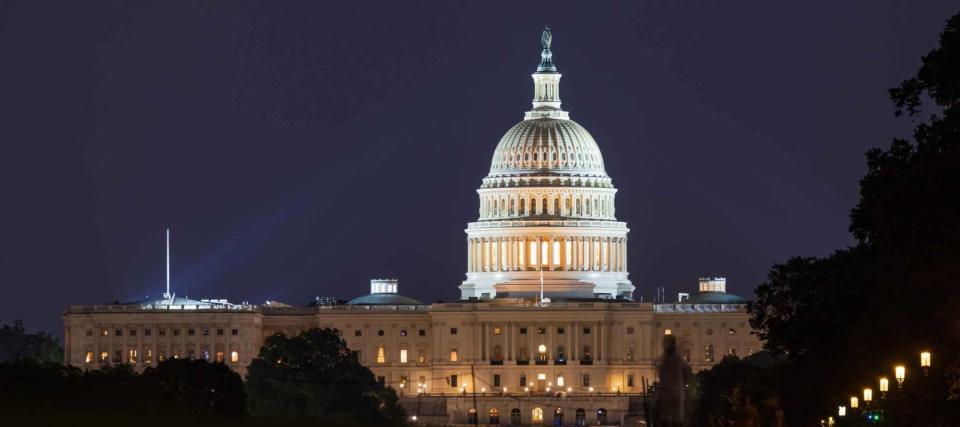The real US debt ceiling X-date could be June 8, Goldman Sachs says — 3 stocks that can protect investors if America defaults

All eyes in the finance world are on the U.S. debt ceiling, and while Treasury Secretary Janet Yellen previously stated the country risks defaulting as early as June 1, some experts are more optimistic.
“Our guess right now is that the real deadline is probably June 8 or 9,” Alec Phillips, chief political economist at Goldman Sachs, told Bloomberg on May 19.
Don't miss
Rich young Americans have lost confidence in the stock market — and are betting on these 3 assets instead. Get in now for strong long-term tailwinds
UBS says 61% of millionaire collectors allocate up to 30% of their overall portfolio to this exclusive asset class
You could be the landlord of Walmart, Whole Foods and CVS (and collect fat grocery store-anchored income on a quarterly basis)
That deadline is just days away and there’s no sign that the debate in Congress over raising the debt ceiling has made any progress.
President Joe Biden and House speaker Kevin McCarthy both characterized their recent discussions over the issue as productive, but talks have yet to bear any fruit.
Meanwhile, some investors have started pricing in a default risk. The yields on Treasury bills set to mature on June 1 and June 6 have surged to over 7% as of May 24.
At this rate, it’s possible investors could react to the current situation in a similar fashion to the debt ceiling crisis of 2011, when markets dropped the closer the U.S. came to defaulting on its obligations.
Some stocks could serve as a safe haven under these circumstances.
Read more: Blackrock’s CEO says art is a ‘serious asset class’ — here’s how you can own a piece of a Pablo Picasso
Microsoft bonds
Treasuries are widely considered a safe option, but a default could test that theory. The next best option could be a corporate bond from a blue-chip American company with robust earnings, like Microsoft.
Microsoft’s bonds that are due on August 8th have a yield of just over 4% as of May 23, according to data cited by the Wall Street Journal. That means the blue-chip tech company is seen as more creditworthy than the government, at least in the short term.
The company also has a triple-A rating from both Moody’s and the S&P, which puts it on par with the U.S. government. The government’s rating, however, was famously lowered when debt ceiling negotiations hit crisis levels in 2011, so this factor is worthy of attention.
Gold ETFs
Gold is a traditional safe haven that seems to hold up well when the U.S. looks less creditworthy. Gold ETFs, like SPDR Gold Shares, rallied in the summer of 2011 prior to President Barack Obama and House speaker John Boehner striking a deal just two days before the limit was expected to be breached.
The SPDR Gold Shares ETF is flat this month. However, gold prices could rise as the deadline to raise the debt limit gets closer. Investors could seek shelter in this asset while the debate rages on.
Berkshire Hathaway
Warren Buffett may just be more creditworthy than Uncle Sam. After all, he’s the man most investors and policymakers turn to when banks are failing or a crisis is brewing.
In recent months, Buffett’s Berkshire Hathaway has been a net seller of stocks and a net buyer of Treasuries. He revealed at a shareholders meeting in early May that the company bought Treasury bills worth $7 billion in April alone and has another $3 billion in Treasuries with yields higher than 6%.
Altogether, the company has a jaw-dropping $130 billion on its books, which is earning higher interest payments as Treasury yields rise. Buffett himself has clearly said that he is not worried about a US debt default, which means he could see the short-term spikes in interest rates as an opportunity.
Berkshire stock currently trades at a price-to-book ratio of 1.39 as of May 25, which is close to Buffett’s old buyback threshold of 1.2. Investors seeking a safe haven may find the current valuation much more appealing.
What to read next
Want to invest your spare change but don't know where to start? There's an app for that
This janitor in Vermont built an $8M fortune without anyone around him knowing. Here are the 2 simple techniques that made Ronald Read rich — and can do the same for you
Here's the annual income you need to fall in America's lower, middle, and upper class — plus 3 simple tips to boost you up the ladder
This article provides information only and should not be construed as advice. It is provided without warranty of any kind.

 雅虎香港財經
雅虎香港財經 